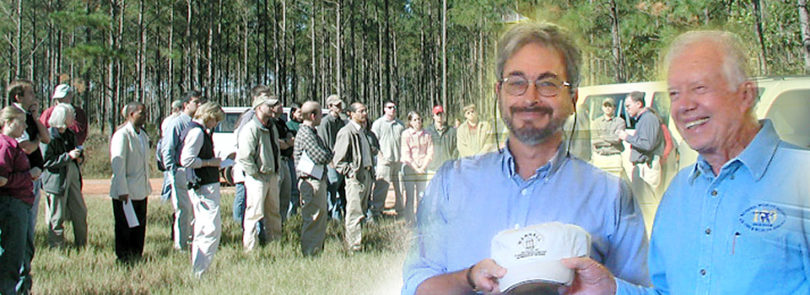Students in UGA’s Daniel B. Warnell School of Forestry and Natural Resources visited Carter Farms, Inc., recently to learn about the stewardship and land management philosophy of former President Jimmy Carter and his forestry consultant, Blake Sullivan, who conducted the tour.
The first stop on the tour was at the edge of a cotton field, which had recently been harvested.
“The Carter farm is a multiple use farm,” said Sullivan. “The land, located in Webster and Sumter counties [in Georgia], has been in President Carter’s family for 100 years this year. Mrs. Carter’s family farmed around here even before that, and her family land is now included in Carter Farms, Inc., as well.”
Sullivan’s management recommendations included planting trees on the less productive farmland and where crops couldn’t be irrigated. Today most of the land is in pine trees, much of it planted under the federal government’s Conservation Reserve Program.
“But we still grow crops, including cotton, soybeans, 20 acres of pecans – and of course, peanuts,” said Sullivan, grinning. “As long as President Carter owns this land, we will grow peanuts.”
Most of the crop land is leased to sharecroppers on a 50/50 split, meaning both the costs of production and the profits are shared equally.
At another stop, students saw a 16-acre stand of slash pines that Carter planted by hand in the mid-1950s. While a forester might see the trees as “over-mature,” Sullivan said they are off-limits to him.
“Mr. Carter likes to see those trees,” said Sullivan, nodding toward the trees across a dirt road. “It gives him a lot of pleasure to see them grow and to walk among them. That’s a part of his value system.”
Sullivan said he and Carter meet every other month, touring the fields and forests in a truck, so they can discuss various management options.
“We try to be good stewards of the land,” said Sullivan, “and to practice forestry in a way that promotes Mr. Carter’s value system. If you grow trees, you’ve got to use them, because otherwise, you won’t be able to afford to practice proper land stewardship. And not only is that important and very satisfying, it’s also the right thing to do.”




